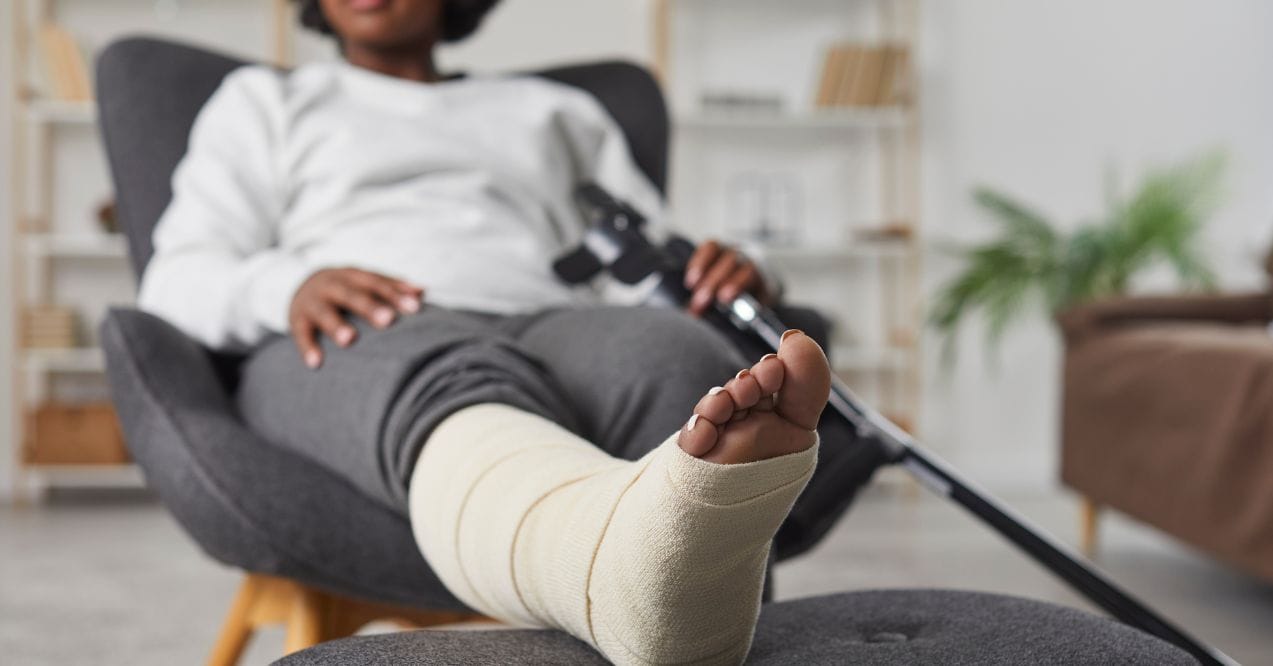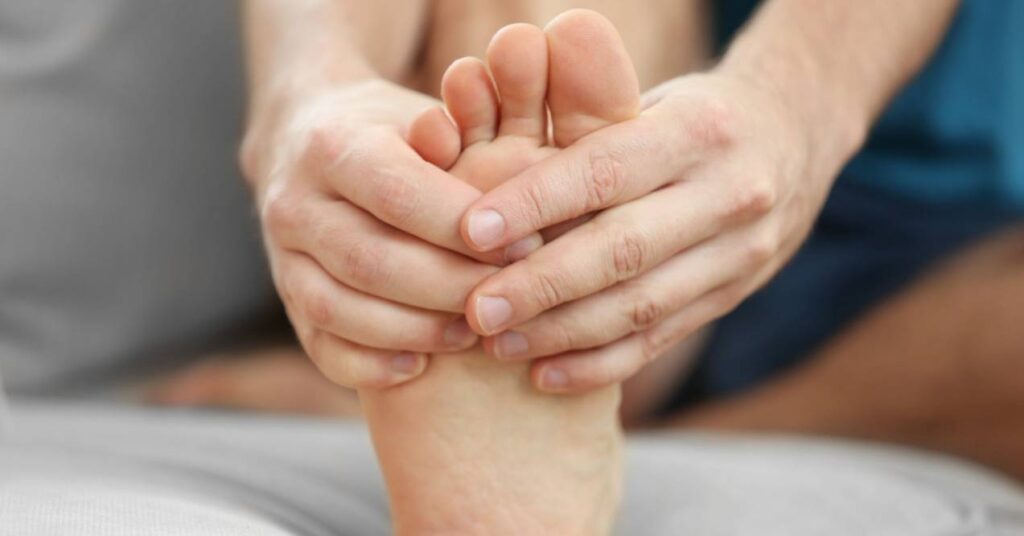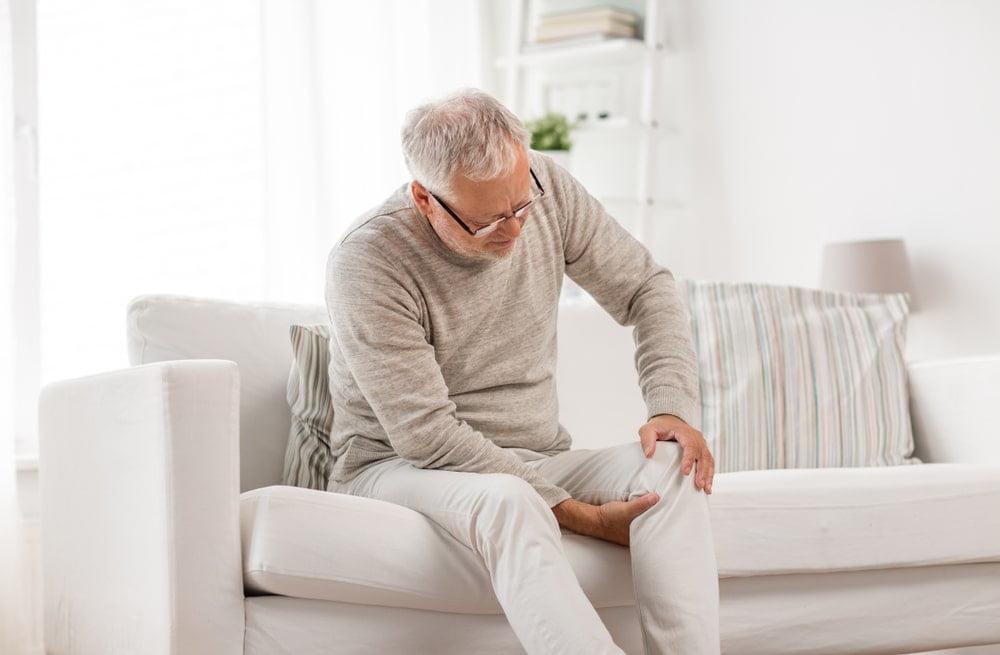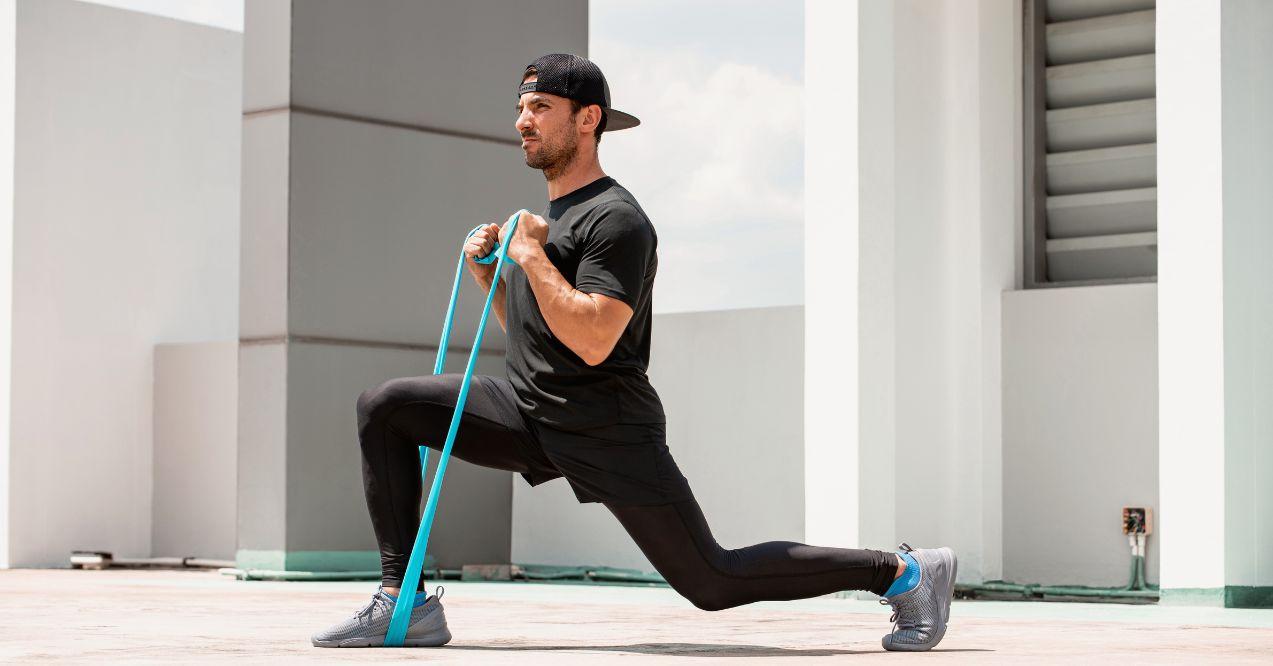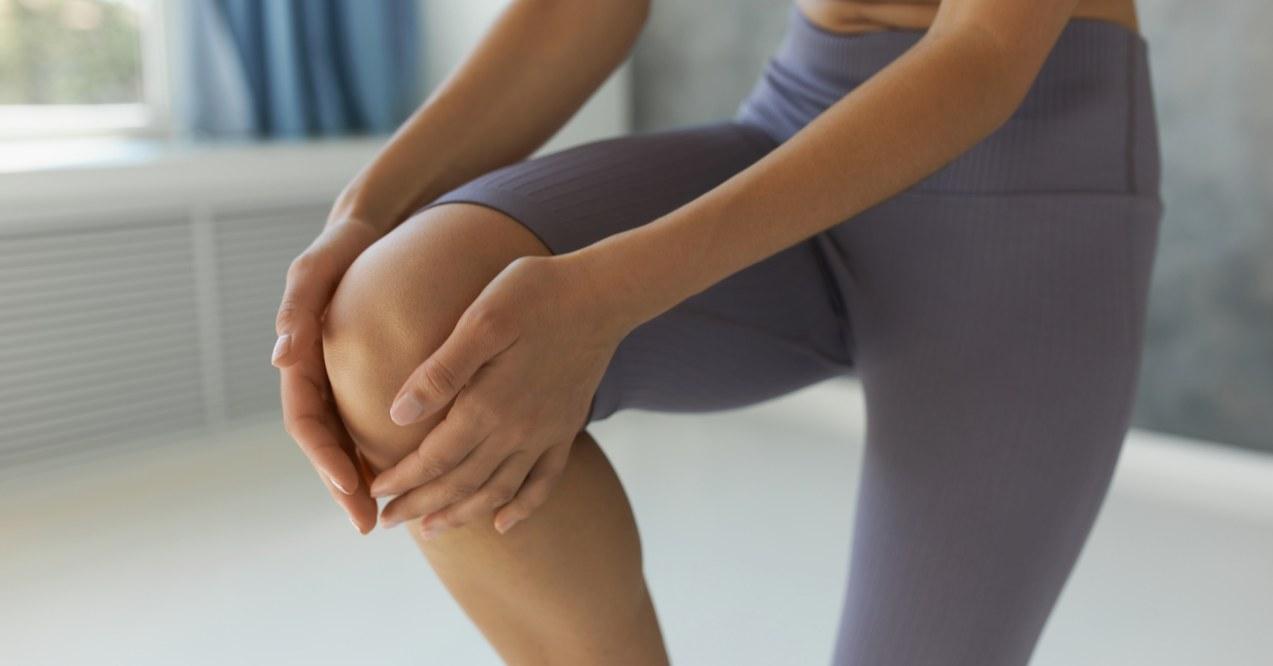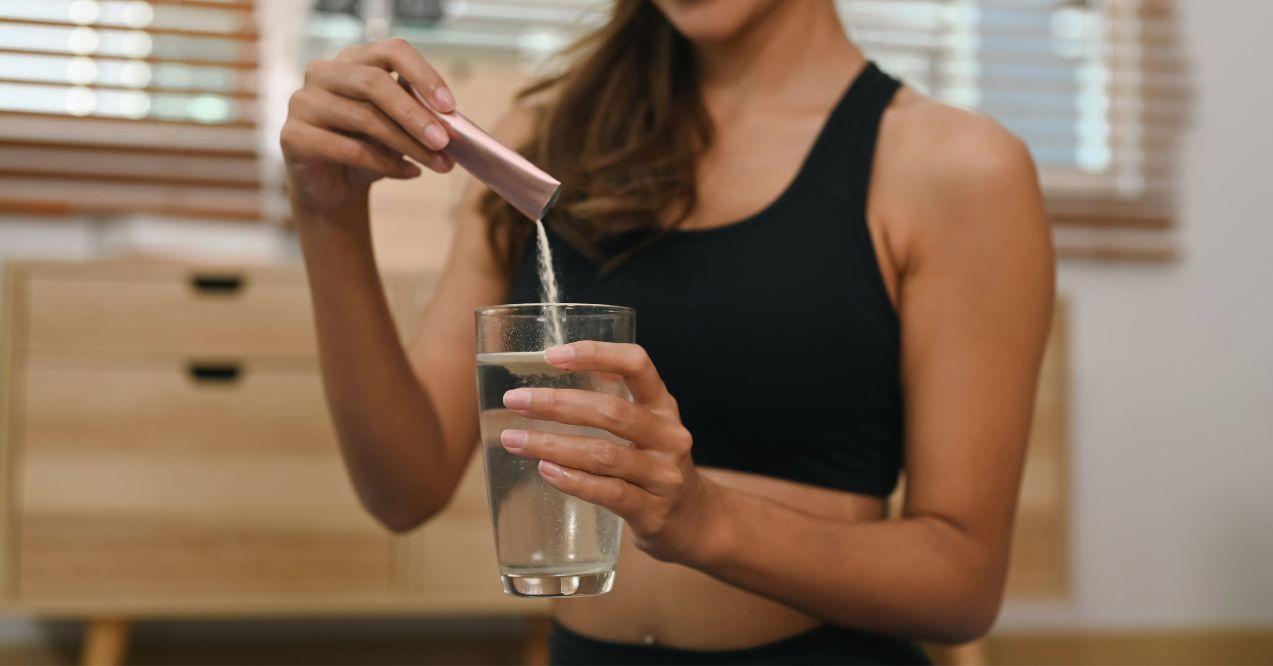5 Best Vitamins for Cracking Knees
Are you experiencing cracking knee sounds that make you worried and uncomfortable? Read more about some of the five best vitamins for cracking knees in 2023.


The sound your knees make may indicate a developing joint problem or a deficiency in essential vitamins for cracking knees in your body. Besides regular exercising and a proper diet, keeping healthy joints also means constantly consuming vitamins like vitamin C, which produces collagen, and vitamin D, which helps in calcium absorption.
When experiencing pain and stiffness in the joints, omega-3 fatty acids can help. Ensure your diet contains citrus fruits, fatty fish, and leafy greens, which carry nutrients necessary for cracking knees. Healthcare professionals may also recommend supplements. Some conditions make cracking knees an everyday occurrence, such as waking up from a long sleep or standing up for long hours.
You may also experience a popping sound when running, walking, or during your daily workouts at the gym, but you don’t necessarily need to worry about this. Cracking knees should not be a hindrance to living a healthy lifestyle. However, the sound your knees make can make you feel uncomfortable or worried about something serious developing, so here we will shed more light on what’s truly going on. In addition, we will also highlight the five best vitamins for loud-cracking knees in 2023.
Before diving deeper, it’s helpful to understand what bones make up the knee joint: the femur (thigh bone), tibia (shin bone), and patella (kneecap). These components work together to allow for the complex movements of the knee, but they can also be sources of noise and discomfort when not properly supported by muscles and cartilage.
What Is Cracking Knees?
Have you experienced some popping sounds coming from your knees? If so, there should be no cause for alarm. Loud, cracking knees should not worry you. Cracking knees means air moving in the knee joints, causing a pop sound.
What Causes Knee Cracking?
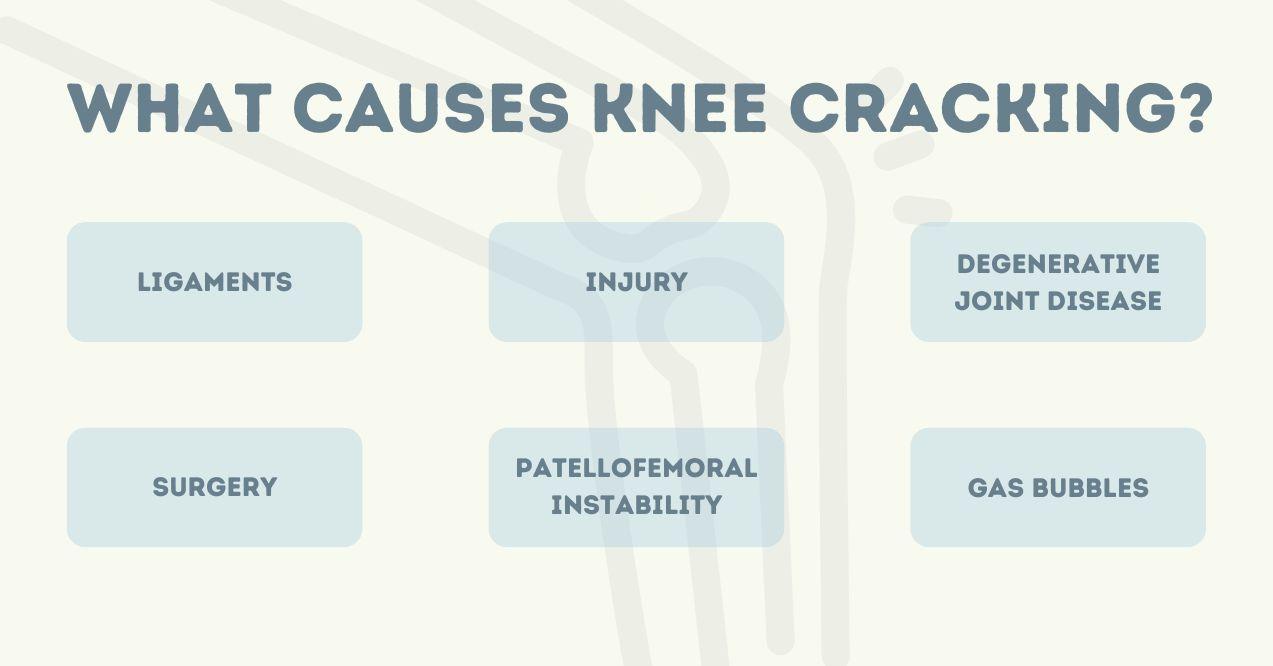
Knee popping is mostly not a cause for alarm. However, it is essential to note that ligament injury, meniscal tear, or patellar tracking problems may result in popping accompanied by pain or swelling in the knee. Here are some additional causes of knee cracking:
- Ligaments: When the ligaments and tendons around the knee joint stretch when passing over a small bony lump, you will likely experience mild or loud knee cracking as they snap back into place. The clicking sound is felt in the knee area.
- Injury: When an accident occurs and you fall on your knee, the result may be extensive damage to the kneecap or other areas surrounding the knee joint, which results in cracked knee noises.
- Degenerative Joint Disease: Degenerative joint disease is a condition denoted at any age but is familiar to people who have hit their 50s. This condition is also known as wear and tear, which commonly affects the joints of the hands, lower back, neck, and weight-bearing joints such as knees, hips, and feet. The mechanical stress and biochemical changes combined break down the cartilage meant to cushion the joint. Suffering from this condition, you will experience inflammation and pain with the knee joint crackling and crunching.
- Surgery: After a successful surgery, your knees are not the same, and they may start getting noisy. The reason is minor changes during the surgery or new features after a successful joint replacement. In most cases, the loud cracking of knees was already there before, only that people notice them more after surgery as they are keener then. It is normal to feel worried from this knee noise, but data confirms that at least 5,000 people suffering from cracking knees after a knee replacement still live an everyday and quality life.
- Patellofemoral Instability: Everyone’s body differs, and the components that make up the knee vary from one person to the other. The differences result from birth, age, or life events such as accidents. You may experience more flex on your knees than another person will. The differences are what make one knee noisier than another person’s.
- Gas Bubbles: When there is a gas buildup in the areas surrounding the joint, tiny bubbles form in the synovial fluid; bending your knee causes some bubbles to burst. The event is regular and painless, and you will feel some noise on your knees as the bubbles burst.
5 Essential Supplements for Healthy Knee Joints
Knee cracking, often resulting from everyday activities, might not always indicate a health concern, but it can certainly be unsettling for many. Incorporating the best supplements for bone and joint health into your diet can support joint health and potentially reduce these unsettling sounds.
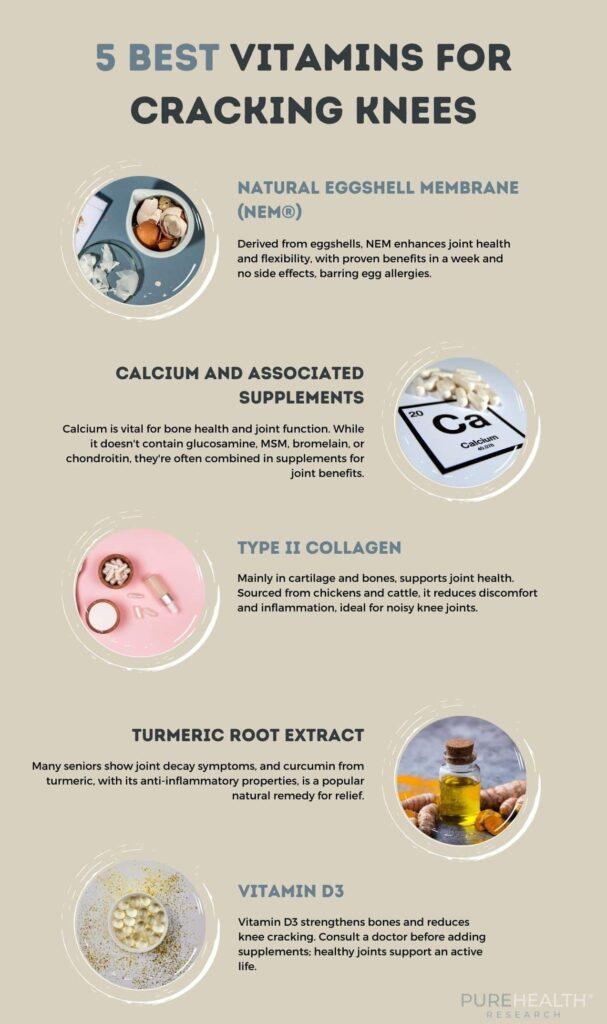
1. Natural Eggshell Membrane (NEM®)
Derived from the inner layer of eggshells, Natural Eggshell Membrane (NEM) is a supplement renowned for its blend of glycosaminoglycans and proteins. NEM also contains natural elements of chondroitin, hyaluronic acid, and glucosamine. These components collectively support joint health and connective tissues.
Two clinical trials indicate that NEM showed meaningful significant results in reducing joint discomfort and enhancing flexibility within a week. Excluding those with egg allergies, there are no adverse effects. Further, with elements like collagen, Boswellia serrata, and ginger, NEM is a powerhouse for promoting joint wellness.
2. Calcium and Associated Supplements
A crucial mineral for bone health, calcium plays a pivotal role in maintaining joint function. Contrary to popular belief, calcium supplements don’t directly contain glucosamine, MSM, bromelain, or chondroitin. However, these are often paired with calcium in joint health supplements because of their combined benefits in addressing joint discomfort and ensuring optimal joint function.
3. Type II Collagen
Predominantly found in cartilage, bones, and other connective tissues, Type II collagen is a protein essential for joint health. Often sourced from chickens and cattle, it aids in producing substances that mitigate discomfort and inflammation, making it a top recommendation for those with noisy knee joints.
4. Turmeric Root Extract
Degenerative joint disease, a prevalent condition in the U.S., frequently affects the knees. Studies suggest that a significant portion of seniors experience inflammatory joint decay symptoms. Curcumin, derived from turmeric root, boasts anti-inflammatory and antioxidant properties. Many individuals with joint discomfort have turned to curcumin as a natural remedy to alleviate their symptoms.
5. Vitamin D3
Vitamin D3, critical for overall bone health, influences bone density and strength. Weak bones or muscles can sometimes be the underlying cause of cracking knees. Additionally, combining vitamin d3 with k2 may be also advisable for a robust skeletal system, mitigating symptoms of cracking knees.
Incorporating these supplements into your wellness regimen can be beneficial. However, always consult with a healthcare professional before making any changes to your diet or supplement intake. Optimizing joint health can pave the way for a more active and comfortable lifestyle.
Guidelines for Robust Knee Health
Being able to walk, jog, or hike without knee discomfort is a privilege many of us might take for granted. To ensure you continue enjoying these activities without the hindrance of knee problems, consider the following knee care strategies:
1. Maintain Healthy Weight
Excess weight imposes undue stress on your knees, accelerating cartilage wear and possibly leading to persistent discomfort. Especially for individuals with knee joint decay, losing weight can offer relief. A balanced weight not only fosters general well-being but also considerably enhances knee functionality.
Similarly, for those experiencing discomfort in the sacroiliac (SI) joint, how to sit with SI joint pain is crucial for minimizing discomfort. Opting for a chair that supports the natural curve of your spine and using a cushion for additional support can significantly alleviate pain. This adjustment ensures that the pressure is evenly distributed, reducing the strain on your SI joint.
2. Treat Knee Injuries Promptly
In case of a knee or joint injury, timely intervention is paramount. Adopt the RICE methodology for immediate relief:
- Rest: Prioritize resting your knees and sidestep activities that may aggravate the injury.
- Ice: Administer a cold compress to the afflicted area for at least 20 minutes daily to mitigate inflammation.
- Compression: Utilize an elastic bandage around the injured knee to alleviate swelling.
- Elevation: Elevate your knee above heart level periodically throughout the day to facilitate reduced swelling.
If the pain becomes debilitating or hinders knee mobility, seek professional medical advice.
3. Pay Attention to Persistent Pain
Don’t dismiss prolonged or intense knee pain; consult a physician promptly. Such pain might indicate an underlying injury or a flare-up of a chronic condition like joint disease. In conjunction with the recommended treatments, consider nutritional supplements and vitamins that support joint health.
4. Strengthen Your Muscles
Fortified muscles act as a protective shield for your knee joints. Augment your fitness regimen with exercises tailored to enhance muscle strength around the knee. Incorporate exercises such as squats, lunges, and leg presses for a more resilient knee support system.
5. Practice a Good Posture
Misaligned posture can exert undue stress on your joints, leading to increased cartilage wear. Adopting a correct posture minimizes this stress and allows muscles to function more efficiently, bolstering your knee support. Key posture pointers include:
- Standing: Ensure your shoulders are rolled back and aligned with your head, which should be level. Engage your core, and position your feet shoulder-width apart.
- Sitting: Lean back so your back is snug against the chair, ensuring your feet are flat on the ground. Aim for a slight gap between the back of your knees and the seat to promote optimal blood circulation.
If maintaining proper posture proves challenging, seek guidance from a physical therapist for targeted exercises.
6. Take Care in Selecting Footwear
The shoes you wear can either support or strain your knees and overall posture. While high heels may elevate style, they also raise the risk of joint decay by imposing extra stress on joints. Opt for footwear that:
- Offers adequate support.
- Features a low or flat heel to alleviate joint strain.
- Ensures mobility and flexibility.
Should you experience foot or knee discomfort, consider specialized shoe inserts or orthotics for added support.
7. Keep Moving
Regular movement is the lubricant for healthy joints. By engaging in consistent physical activity, you facilitate better joint lubrication and muscle health. Opt for exercises that are kind to your joints yet offer the needed resistance, such as cycling, swimming, or brisk walking.
8. Hydrate
Your cartilage is primarily composed of water – a whopping 80%. To maintain optimal joint health and counteract potential dehydration-induced joint pain, aim to consume at least two to three liters of water daily. Proper hydration supports the cartilage, reducing the risk of discomfort.
Joint pain from dehydration can exacerbate existing discomfort, as a lack of adequate fluids affects the lubrication and cushioning of joints. Ensuring you’re well-hydrated is a simple yet effective step towards minimizing joint pain and promoting overall joint health.
9. Consider the Joint Support Product
Maintaining flexible knee joints becomes easier with the Joint Support supplement from PureHealth Research.
Key ingredients like NEM®, Type II collagen, Boswellia serrata, ginger, turmeric, black pepper extract, and calcium are specially selected for their powerful impact on joint function and immune health. Joint Support’s therapeutic efficacy isn’t just a claim; it’s solidified by multiple scientific studies attesting to its transformative effects and is endorsed by Dr. Holly Lucille. Imagine seamlessly rising from your seat, fluidly descending stairs, or dancing with unrestrained joy – that’s what Joint Support promotes.
As with all supplements, it’s crucial to follow the recommended dosage for Joint Support. It’s noteworthy that pregnant or nursing individuals, and those under 18, should seek a doctor’s advice before purchasing or using this or any dietary supplement.
The seven dynamic ingredients in this supplement alleviate joint-related discomfort, promote healthy immune responses and improve joint flexibility, walking, standing, and range of motion. Its unique formulation is tailored to diminish knee joint stiffness, soreness, and swelling, enhancing mobility. Consequently, this rejuvenates your youthful spirit. Embrace Joint Support and remain unhampered in pursuing your cherished hobbies, no matter your age.
In addition to these supplements, learning how to improve joint health plays a pivotal role in managing knee cracking and discomfort. Strengthening exercises that target the muscles around the knees, such as quadriceps and hamstrings, can significantly improve joint stability. Moreover, incorporating flexibility and balance exercises into your routine can enhance joint function and prevent injuries. A holistic approach, including a balanced diet rich in antioxidants and healthy fats, can also support long-term joint health.
Final Thoughts
There’s no universal remedy for cracking knees; what works for one person might not work for another. Thus, it’s imperative to consult a physician before incorporating any of the vitamins we’ve highlighted for knee concerns. Beyond vitamins and supplements, a holistic approach to joint health is key.
This includes embracing a balanced lifestyle, maintaining a healthy weight through regular exercise and a nutritious diet, and avoiding activities that excessively burden the joints, leading to intensified knee discomfort or cracking. By integrating these strategies, those grappling with knee issues can pave the way for diminished pain and enhanced joint performance.
Knee cracking can be caused by ligament or tendon movement, gas bubbles in the joint, degenerative joint disease, injury, or surgery.
Generally, knee cracking without pain is not a cause for concern. However, if accompanied by pain or swelling, it may indicate an underlying issue.
Key vitamins for knee health include Natural Eggshell Membrane (NEM®), Calcium, Type II Collagen, Turmeric Root Extract, and Vitamin D3.
Maintain a healthy weight, treat injuries promptly, strengthen muscles, practice good posture, choose supportive footwear, stay active, and hydrate well.
Yes, if you experience persistent pain, swelling, or significant discomfort with knee cracking, consult a healthcare professional.
Sign up for our Healthy Living newsletter!
Advertisement. This site offers health, wellness, fitness and nutritional information and is designed for educational purposes only. You should not rely on this information as a substitute for, nor does it replace, professional medical advice, diagnosis, or treatment. If you have any concerns or questions about your health, you should always consult with a physician or other health-care professional. Do not disregard, avoid or delay obtaining medical or health related advice from your health-care professional because of something you may have read on this site. The use of any information provided on this site is solely at your own risk.




